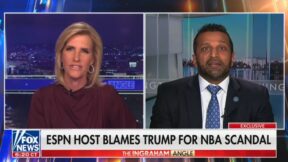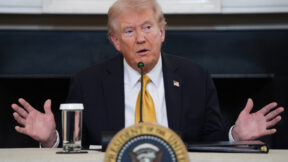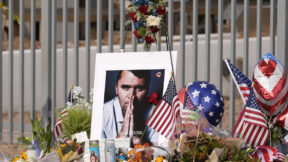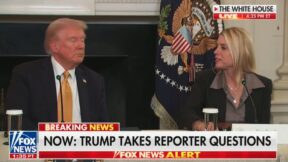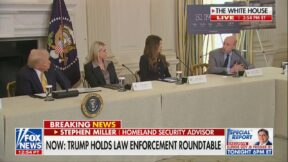Jim Acosta Clashes With NRA Board Member: ‘Isn’t This Blood on Your Hands?’ ‘I’m Not The One Who Pulled the Trigger!’
CNN Newsroom host Jim Acosta clashed with NRA board member Judge Phillip Journey over the proper response to mass shootings like the horror that unfolded at Robb Elementary School in Uvalde, Texas last week.
Acosta began the segment noting the front page of The New York Times’ Sunday Review section, which listed multiple mass shootings where “Authorities said the gunman was able to obtain the weapon[s] legally.”
The interview got off to a contentious start, with Acosta challenging Journey about the NRA’s opposition to gun reform measures.
“For years your group has blocked new gun safety laws and pushed for the most relaxed rules on firearms,” said Acosta. “Isn’t some of this blood on the NRA’s hands?”
Journey thanked Acosta for having him on the show but objected, saying “I don’t believe the supposition of your question is accurate.” He continued that he was not the official spokesperson but had “followed the issue closely” and claimed that the NRA, other organizations, and he as a Kansas state senator had all “worked to tighten the laws.”
“I think that it’s important to understand–” Journey said before Acosta cut in.
“No, no, no, sir — I hope you understand I’m going to have to cut you off when you start saying things that just aren’t true,” Acosta interjected. “The NRA has not worked to tighten rules. That’s just not the case. The NRA for years, for decades, has pushed for the most relaxed rules possible in this country, and that’s why we have mass shooting after mass shooting.”
“Please if you could answer the question I asked you at the beginning of the interview,” Acosta asked again, “isn’t this blood on your hands?”
“I’m not the one that pulled the trigger and neither are the members of the National Rifle Association,” Journey retorted. He brought up the shooting at the grocery store in Buffalo, New York earlier this month, where “the alarms were going off in New York and all the officials did was hit the snooze button,” where the alleged shooter “was a danger to himself or others” and had “already threatened mass shooting prior, and nobody did anything.”
“Well,” Acosta replied, should a “troubled young man” be able to “go out and buy an AR-15 style assault rifle, which is what happened in Buffalo, which is what happened in Uvalde?”
The NRA was holding its convention in Houston as they were speaking, Acosta noted, “just a few days after the massacre in Uvalde,” and former President Donald Trump could be seen dancing on stage at the end of his remarks Friday.
Trump began his remarks Friday reading out the names of the Uvalde victims, but dropped the reverent tone for far more combative political rhetoric before the end of his speech, when he could be seen dancing as music played.
“He was not,” Journey argued. “I was there. He was not dancing. Give me a break.”
“How is any of this at all appropriate?” Acosta countered. “We’re showing it on stage right now. He’s doing a little jig there. People are waving their NRA hats, and so on, it’s the celebratory atmosphere, right after a mass shooting where all of these kids are gunned down. How is that appropriate?”
Journey said Acosta was “just telling part of the story” because Trump had “a very memorable memorial for the victims” at the beginning of his speech.
“Right, but why even have the convention?” asked Acosta. “Why not cancel the convention out of some measure of decency? Why not have some decency for these kids? They just lost their lives. Couldn’t you postpone the convention, have it some other time?”
“The timing was almost impossible to address that question the way you want us to,” Journey replied, noting that contracts had been signed and vendors were already in town and set up. The NRA had been able to delay their convention in 1999 after Columbine, he said, because there had been more time between the shooting and the original scheduled date for the event.
Later in the segment, Acosta asked about the common saying among gun rights supporters that “the answer to all of this is good guys with guns,” but in Uvalde, the good guys with guns had “failed.”
“The issue of law enforcement is a separate question from what we’re talking about today,” Journey said, agreeing that these officers’ “performance has left something to be desired,” mentioning the stunning press conference Friday afternoon where Texas Department of Public Safety spokesman Stephen McCraw admitted that police responding to the shooting made the “wrong decision” to treat the situation as a “barricaded subject” instead of an “active shooter.”
Acosta then turned to the AR-15, the gun used by the 18-year-old shooter in Uvalde, as well as by many other perpetrators of mass shootings. “Why do people need an AR-15 anyway?” he asked. “How is it an 18-year-old can buy an AR-15 style rifle and have 1600 rounds of ammo like we saw with him in Uvalde?”
The AR-15 was “just a semi-automatic rifle,” Journey said, adding that the previous assault weapons ban had affected guns like it but still allowed “rifles of similar function that just didn’t look as ugly,” prohibiting one style of gun and allowing the other over cosmetic differences.
Specifically regarding the Uvalde gunman, Journey commented that he had no prior convictions and had bought the gun legally, through a licensed firearms dealer.
“Right, but should an 18-year-old have an AR-15?” Acosta pressed him.
Journey responded by noting that 18-year-olds were issued similar weapons in the army.
“They have military training in the army,” Acosta responded. “This 18-year-old in Uvalde did not have military training. He turned 18 and he went out and bought an AR-15.”
These issues, said Journey, were “far more complicated than whether we remove something from the public.”
Acosta noted that 18-year-olds were prohibited from buying beer or cigarettes.
Politicians called for gun control, argued Journey, because solving these mass shootings was “complicated,” and gun control “doesn’t cost them any money,” unlike “fixing the mental health system in this country.”
Acosta brought up background checks, cueing up a video of NRA President Wayne LaPierre in 1999 voicing support of background checks.
The states were the “soft hole in the background check system,” Journey said, because they often failed to report felony convictions and involuntary commitments when people were found to be a danger to themselves or others.
Acosta wrapped up the interview by commenting that he was 51 years old, and “this has been going on for decades, and it just seems to me that the NRA just has to look into its soul, and I’m sorry to say it that way, sir, but you and your other board members need to look into your souls and see what can be done for these kids, these kids who keep dying over and over again, over and over again.”
Watch the video above, via CNN.
